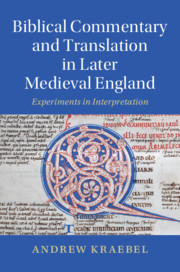Book contents
- Biblical Commentary and Translation in Later Medieval England
- Cambridge Studies in Medieval Literature
- Biblical Commentary and Translation in Later Medieval England
- Copyright page
- Dedication
- Contents
- Figures
- Acknowledgments
- Abbreviations and Conventions
- Introduction
- Chapter 1 Interpretive Theories and Traditions
- Chapter 2 Eclectic Hermeneutics: Biblical Commentary in Wyclif’s Oxford
- Chapter 3 Richard Rolle’s Scholarly Devotion
- Chapter 4 Moral Experiments: Middle English Matthew Commentaries
- Epilogue: John Bale’s Dilemma
- Book part
- Notes
- Bibliography
- Index of Manuscripts
- General Index
- Cambridge Studies in Medieval Literature
Chapter 3 - Richard Rolle’s Scholarly Devotion
Published online by Cambridge University Press: 22 February 2020
- Biblical Commentary and Translation in Later Medieval England
- Cambridge Studies in Medieval Literature
- Biblical Commentary and Translation in Later Medieval England
- Copyright page
- Dedication
- Contents
- Figures
- Acknowledgments
- Abbreviations and Conventions
- Introduction
- Chapter 1 Interpretive Theories and Traditions
- Chapter 2 Eclectic Hermeneutics: Biblical Commentary in Wyclif’s Oxford
- Chapter 3 Richard Rolle’s Scholarly Devotion
- Chapter 4 Moral Experiments: Middle English Matthew Commentaries
- Epilogue: John Bale’s Dilemma
- Book part
- Notes
- Bibliography
- Index of Manuscripts
- General Index
- Cambridge Studies in Medieval Literature
Summary
Chapter 3 considers the development of scholastic exegesis outside the universities, focusing on the Yorkshire hermit-mystic Richard Rolle (d. 1349). With only a limited university education, Rolle turned to scholastic commentary, especially on the Psalms, to create material for devotional reading, and he wove authoritative opinions quarried from major scholastic sources together with glosses that read different psalms as describing his distinctive mystical experiences. Rolle wrote two Psalter commentaries reflecting these priorities, first in Latin and then in English, with the later work representing a substantial revision of the earlier one. After assessing the development of his interpretive program across these texts, the influence of Rolle’s vernacular commentary is then charted, focusing on its revision in the last quarter of the century and the various works that imitate its form. Finally, by considering the citations of Rolle’s works by Oxford theologian Richard Ullerston, this chapter reveals the success of Rolle’s hermeneutic project, arguing that the hermit returned to the university with an authority that was at once scholastic and devotional.
Keywords
- Type
- Chapter
- Information
- Biblical Commentary and Translation in Later Medieval EnglandExperiments in Interpretation, pp. 91 - 132Publisher: Cambridge University PressPrint publication year: 2020

